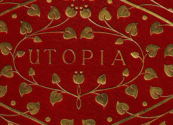Discussion Questions for New Blazing World
by Carrie Hintz
Stephen Spencer sent the following discussion questions for next class. I am posting them because he is experiencing some kind of technical difficulty which is preventing him from joining the blog. See you Thurs! CH
1) In the epilogue, I was struck by the rather direct association Cavendish makes between imperialism and authorship (“By this poetical description, you may perceive, that my ambition is not only to be Empress, but Authoress of a whole world”). My impulse is to say that this is motivated by gender politics. As a woman, Cavendish wanted to be able to enter the male dominated public sphere, as she is clearly enormously intelligent. Still, her association of publication with imperialism strikes our modern ears as disconcerting. I think it’s particularly fascinating given debates about imperialism in the early modern period (was their a “nascent” imperialism in early modern texts? Is it anachronistic to consider imperialism in the period?). My question is broad — does gender help us to understand the relationship between imperialism and authorship in the New Blazing World?
2) Animals obviously play a huge role in the New Blazing World, but I found myself thinking of their presence in the text in terms of technology. Not only do they literally assist in the technology necessary in the Empress’s colonial/imperial endeavors (the fish men pulling the submarines, the bird-men and their firebombing), they also form the basis for the Blazing World’s construction of knowledge (the worm-men as geologists/earth scientists). The horse, however, seems to be a privileged animal. The Emperor is fascinated by horsemanship, so much so that he builds an infrastructure for riding and caring for horses towards the end of the text. What is so special about horses?
3) Much importance is placed on the Empress’s relationship with The Duchess of Newcastle. Much of this is framed by the notion of the “Platonic friendship,” which, at the time, was seen as specific to male-male relationships; women were not usually considered “capable” of fostering a “friendship.” Clearly, we see the opposite in the New Blazing World, but my question is related to my scare-quoting: what does their friendship (and friendship in general) mean in this text? To what extent can the relationship between the Empress and the Duchess be considered erotic, as opposed to Platonic?
4) Cavendish constantly reminds us of the importance of both sense and reason in intellectual endeavors. Concerning sense perception, vision, — for me — is privileged in this text. One need only think of the bears and their microscopes to see this; the microscopes are an improver of vision, they say. I’m curious, however, about the role of the other senses in this text. What roles do the four other, “lower” senses play in the New Blazing World?
5) There’s an issue between class and knowledge in the New Blazing World, and this issue seems to be mediated by the question of the animal. There’s definitely a class hierarchy in the Blazing World, but its interesting to think that it is also dependent, or tied to, the kind of intellectual function each class of human-animal occupies (I’m thinking of the experimentalist Bear-Men as working class knowledge-makers of sorts). What does Cavendish mean to convey with this fixity of class and knowledge-production, and why is it all couched in a kind of allegorical reading of animals?


